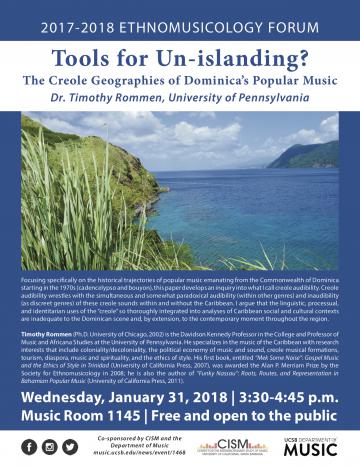Event Date:
Date: 3:30-5PM January 31, 2018
Location: Music 1145
Tools for Un-islanding? The Creole Geographies of Dominica’s Popular Music
Timothy Rommen
University of Pennsylvania
Focusing specifically on the historical trajectories of popular music emanating from the Commonwealth of Dominica starting in the 1970s (cadencelypso andbouyon), this paper develops an inquiry into what I call creole audibility. Creole audibility wrestles with the simultaneous and somewhat paradoxical audibility (within other genres) and inaudibility (as discreet genres) of these creole sounds within and without the Caribbean. I argue that the linguistic, processual, and identitarian uses of the “creole” so thoroughly integrated into analyses of Caribbean social and cultural contexts are inadequate to the Dominican scene and, by extension, to the contemporary moment throughout the region. New questions emerge in light of these Dominican musical trajectories: Can we think about creole sounds as instantiating, following Michel Foucault, a particular type of (very productive) heterotopia? That is, can cadencelypso and bouyon play the role of a sonic mirror that is simultaneously sounding the “there where I am” and the “there where I am not” of the Dominican social imaginary? What might thinking about these genres as sonic mirrors (both utopian and heterotopic, both audible and inaudible, both bounded and borderless) afford us in terms of developing critical purchase on the contemporary dynamics of small places (Dominica) and peripheral spaces (the Caribbean)? Can creole audibility be productively nuanced by recent work in archipelago studies that explores how the ubiquitous presence of the sea informs the relations between simultaneously interconnected yet isolated and discreet spaces? Put otherwise, are cadencelypso and bouyon shaped by an archipelagic (as opposed to an islanded) understanding of space that informs both social imaginaries and sonic possibilities? Finally, can we, in answering these questions, begin to understand the creole sounds of Dominica as decolonial tools—as tools for un-islanding? As Gordon Henderson (the pioneer of cadencelypso) has put it: “Some may say we are divided by the sea. I say we are linked by the sea.”
Timothy Rommen (Ph.D. University of Chicago, 2002) is the Davidson Kennedy Professor in the College and Professor of Music and Africana Studies at the University of Pennsylvania. He specializes in the music of the Caribbean with research interests that include coloniality/decoloniality, the political economy of music and sound, creole musical formations, tourism, diaspora, music and spirituality, and the ethics of style. His first book, entitled "Mek Some Noise": Gospel Music and the Ethics of Style in Trinidad (University of California Press, 2007), was awarded the Alan P. Merriam Prize by the Society for Ethnomusicology in 2008. His is also the author of “Funky Nassau”: Roots, Routes, and Representation in Bahamian Popular Music (University of California Press, 2011). He is contributing author to and co-editor, along with Daniel Neely, of Sun, Sea, and Sound: Music and Tourism in the Circum-Caribbean (Oxford University Press, 2014). His current projects include a musical ethnography of Dominica and an edited volume on the political economy of music and sound in Caribbean tourism.

